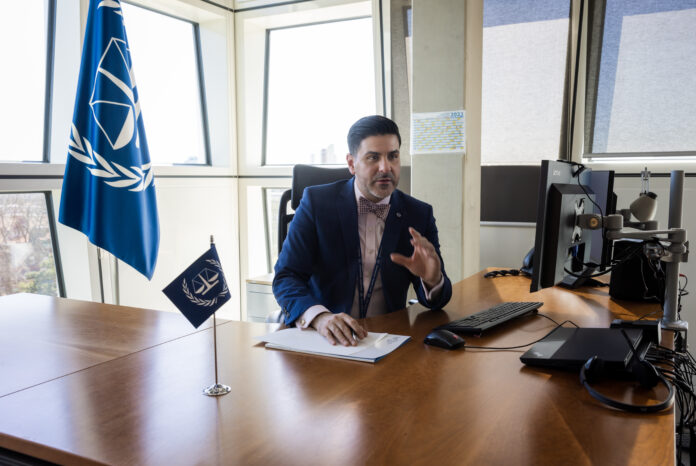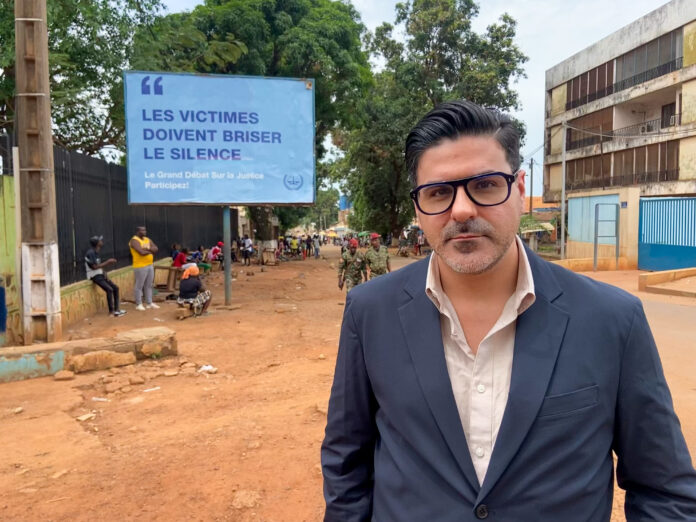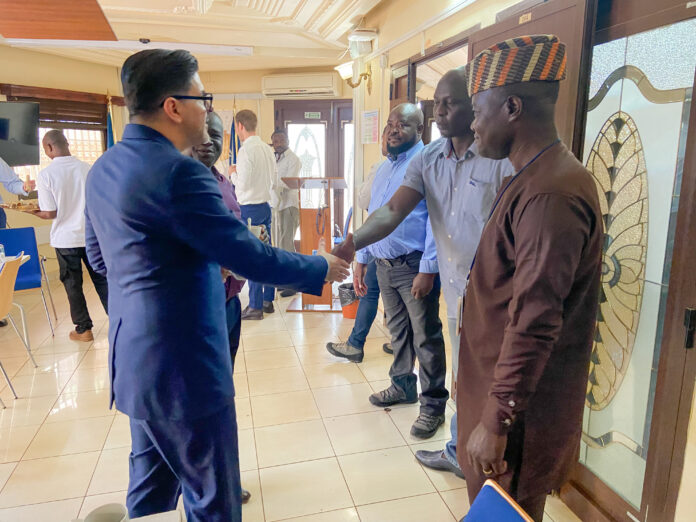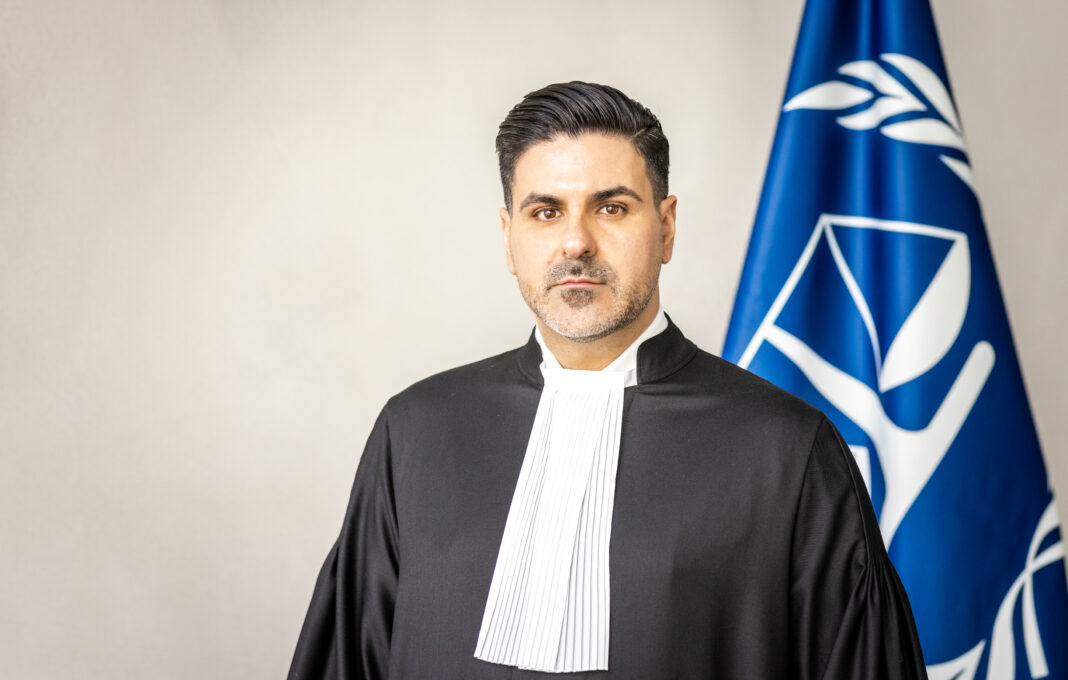On 5 April 2023, Osvaldo Zavala Giler (Ecuador) was sworn-in as the new Registrar of the International Criminal Court (ICC), succeeding Mr Peter Lewis (United Kingdom). Mr Zavala Giler was elected by ICC judges for five years. In this exclusive interview with Diplomat Magazine, the new Registrar discusses some of his priorities and his vision for the Court.
What is your role as the Registrar of the ICC?
I am the principal administrative officer of the ICC. I am responsible for all the non-judicial aspects of the administration of the Court.
The Registry is the neutral organ of the Court that supports the Judiciary and the Office of the Prosecutor, as well as other parties and participants such as the defence and the representatives of victims. Effective judicial support services are essential to the Court’s functioning, inside and outside the Courtroom. It also includes running our detention facilities, as well as performing all the translation and interpretation services needed.
In addition to this aspect, my role is also to ensure the proper administration of the Court, as a public international organization. In this context, the Registry plays a critical role in managing the Court’s annual budget, dealing with staffing and recruitment, ensuring the security of the Court, and enabling a safe and inclusive work environment and culture in the organization, for everyone who works in it.
Finally my role is also to foster engagement and communication with a wide array of external partners: by conducting public information and outreach, ensuring cooperation with the ICC, and managing our offices in various situation countries across the world.

What is your background?
I am from Ecuador. I have over sixteen years of experience on the work of the ICC, in different capacities, including as Chief of the Budget Section, senior special assistant to the Registrar and Head of Office of the Court’s liaison office to the United Nations in New York. I was also a founding member of ICCQ, the Sexual and Gender Diversity Network at the Court
Before joining the Court, I worked as a legal officer, legal adviser and liaison officer to the United Nations for the Coalition for the International Criminal Court, a partnership of civil society organizations, in The Hague and in New York. In Ecuador, I also worked in a law firm from 2000 to 2003, where I had the opportunity to work on cases before the Inter-American Commission on Human Rights.
Because of this experience, I understand well the functioning of the Registry, the ICC and the Assembly of States Parties. And I am well aware of the opportunities, challenges and expectations that come with this position. It is a great honour and a vast responsibility.
What are your priorities during your mandate?
In times of heightened expectations and challenges, my priorities will be to contribute to continuing to build the ICC as a model of modern public administration that ensures effectiveness and safeguards accountability.
More concretely, this will mean to: i) deliver on the important investment and commitment made by our States Parties through the increased budget they adopted for the Court for 2023, and ensure the Court has the capacity to effectively and efficiently deliver its mandate, ii) promote a healthy and productive working environment, iii) galvanize trust and support from stakeholders, and iv) safeguard cooperation including, in particular, regarding witness protection and the execution of pending arrest warrants.
I will encourage a working environment that promotes professionalism, respect, diversity, inclusion and equality. It is simple: being treated with respect, feeling safe in your own working environment, encourages motivation, increases innovation, supports engagement and better performance.


What challenges and opportunities do you foresee?
In my view, the main overarching strategic challenge faced by the ICC is the continuous consolidation of its legitimacy. While the Court’s legitimacy is not always at risk, it is constantly at stake and is often impacted by some of the more systemic issues affecting the institution, as these directly affect the trust placed on the organization by its stakeholders and the international community as a whole.
The Registry contributes to strengthening the Court’s legitimacy first and foremost by guaranteeing its operational sustainability.
In this regard, servicing the Court by ensuring its operational sustainability is the most direct and comprehensive responsibility of the Registrar. It encompasses, among other duties, building and sustaining a public administration that is accountable, responsible and efficient; and maintaining the support services required by the Judiciary and the parties and participants to the proceedings to bring to effect the judicial mandate of the Court.
As it is States Parties that contribute through their national finances to the Court’s budget, the Registrar must guarantee the most cost-effective and efficient use of resources, while fostering an environment of fiscal responsibility for the demand and use of those resources. An efficiently run and fiscally responsible administration will allow for a constructive environment based on trust and respect that will be more conducive for stakeholders’ willingness to increasingly support the work of the Court.
Another key challenge, and an opportunity, is cooperation from States Parties and support from stakeholders, including, as appropriate, non-States Parties, international and regional organizations, civil society organizations, and societies impacted by the work of the Court. Without cooperation and support, the Court is unable to execute some of the most fundamental aspects of its judicial mandate.
How do you plan on improving diversity at the Court?
Diversity in the workplace, including gender balance, geographical representation and multilingualism, must become an internalized priority of the Court. This is essential to ensure a more dynamic, productive and representative workforce.
The improvement of workplace culture is reliant on leadership commitment. A safe, secure, diverse, respectful and productive working environment must be sustained by leaders who embody and reflect with their behaviour the values demanded of the organization. Leaders should not tolerate, in any form or degree, conducts that promote expressions of hatred, racism, discrimination, including gender discrimination and discrimination against members of the LGBTQI+ community, abuse of authority, harassment and/or sexual misconduct. I want us to lead by example.
| The International Criminal Court (ICC) investigates and, where warranted, tries individuals charged with the gravest crimes of concern to the international community: genocide, war crimes, crimes against humanity and the crime of aggression. Based in The Hague, The Netherlands, the Court was established by the Rome Statute, an international treaty ratified by 123 countries. As a court of last resort, the ICC complements national tribunals. The Office of the Prosecutor is currently investigating 17 situations on different continents. ICC judges have issued 40 arrest warrants and 9 summonses to appear. 7 persons are currently in ICC custody. |



